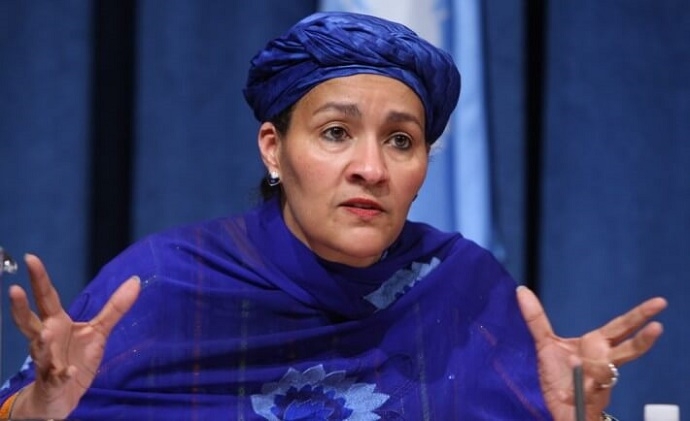 Amina Mohammed, Minister of Environment[/caption]
Amina Mohammed, Minister of Environment[/caption]
The Minister of Environment, Amina Mohammed, has assured Nigerians that Genetically Modified Organism (GMO) poses no harm, as GM crops are not grown in the country.
GMOs are organisms whose genetic material has been artificially manipulated in a laboratory through genetic engineering, or GE.
Recently, Nigerians have expressed concern that GM crops are grown in Nigeria, taking to various platforms including the social media to protest the use of these organisms, stating that GMOs are related with health problems, environmental damage and violation of farmers’ and consumers’ rights
Advertisement
The Minister of Environment, Mrs Amina Mohammed who made the clarification on Monday in a statement issued by the Director of Press in the ministry, Alhaji Isiaka Yusuf said, “What we have approved are for field trials.
“All the GMOs in Nigeria officially approved are under experimental fields,” she said.
She said this included the insect resistant cotton for commercial release, which would still be subjected to further processes for the next two years.
The minister described concerns being expressed by the public on GMOs as “legitimate.’’
Advertisement
She said ministry in collaboration with the National Biosafety Management Agency (NBMA) would organise a meeting, involving Civil Society groups, national agencies and international organisations to address all concerns expressed.
The minister said the aim was to clarify Nigeria’s position on the use of GMOs.
Mohammed said National Biosafety Management Agency (NBMA), established in 2015, under the ministry was charged with ensuring proper regulation of modern biotechnological activities and genetically modified organisms.
The minister said that this was to protect the lives of Nigerians.
According to her, with the Act in place, Nigeria has taken laudable strides to adopt the necessary legal biosafety framework and policy.
Advertisement
She said that was done, bearing in mind that “if Nigeria gets it right, it will guide other African countries.’’
“The quest for Nigeria’s biotechnological advancement dates back to 2001 when the country adopted a National Biotechnology Policy and subsequently established the National Biotechnology Development Agency,’’ she said.
The minister said the agency was not working alone, but partnering critical stakeholders such as Nigerian Customs, the Nigerian Security and Civil Defence Corps (NSCDC), National Agency for Food and Drug Administration (NAFDAC).
Others, she said are Ministry of Justice, Nigeria Agricultural Quarantine Service, National Seed Council, Science and regulatory based institutions, New Partnership for Africa Development (NEPAD) and African Biosafety Network of Expertise (ABNE).
“Over 20 research institutes, private biotechnology firms and universities are also players in the biotechnology sector,’’ she noted.
The minister said NBMA had the onerous task of ensuring that potential impacts of the GMO on human or animal health, environment and socio-economic effects were carefully weighed.
Advertisement
She added that the agency would ensure that the risk assessment was fully carried out before GM crops were released.


